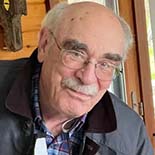 Lawrence Raab, American poet, born 1946.
Lawrence Raab, American poet, born 1946.
JUST NOW
Lawrence Raab
Who decided death was a good idea?
That lying in the ground in a box
is the right kind of ending?
More life is what I want.
But not surrounded
by all these quarrels
and deceptions
and crippling desires.
The world after this one
should have nothing in it
to covet or envy. Nothing
for time to disfigure,
rip apart, take away.
Therefore: no time.
Which left stillness
everywhere. I saw it then––
the boredom of clouds
and soft music, until someone
just sitting around remembers
a small treasure he hadn’t
been allowed to bring with him,
since everything particular
is real, and therefore
impossible to save.
Like a favorite hat.
Or a bracelet. Or that colorful
wisp of a scarf you were wearing
the afternoon we met in the park.
I said something
about the sky. You pointed
to the light shimmering
through the tall pines as we
were leaving, and I
touched your hand
as if by accident.
As if I had changed my mind
about the future. Look,
you said, turning back
to see what was gone–
how lucky
we are to have been here
just now.
====
MARRIAGE
Lawrence Raab
Years later they find themselves talking
about chances, moments when their lives
might have swerved off
for the smallest reason.
What if
I hadn’t phoned, he says, that morning?
What if you’d been out,
as you were when I tried three times
the night before?
Then she tells him a secret.
She’d been there all evening, and she knew
he was the one calling, which was why
she hadn’t answered.
Because she felt—
because she was certain—her life would change
if she picked up the phone, said hello,
said, I was just thinking
of you.
I was afraid,
she tells him. And in the morning
I also knew it was you, but I just
answered the phone
the way anyone
answers a phone when it starts to ring,
not thinking you have a choice.
====
REQUEST
Lawrence Raab
For a long time I was sure
it should be “Jumping Jack Flash,” then
the adagio from Schubert’s C major Quintet,
but right now I want Oscar Peterson’s
“You Look Good to Me.” That’s my request.
Play it at the end of the service,
after my friends have spoken.
I don’t believe I’ll be listening in,
but sitting here I’m imaging
you could be feeling what I’d like to feel––
defiance from the Stones, grief
and resignation with Schubert, but now
Peterson and Ray Brown are making
the moment sound like some kind
of release. Sad enough
at first, but doesn’t it slide into
tapping you feet, then clapping
your hands, maybe standing up
in that shadowy hall in Paris
in the late sixties when this was recorded,
getting up and dancing
as I would not have done,
and being dead, cannot, but might
wish for you, who would then
understand what a poem––or perhaps only
the making of a poem, just that moment
when it starts, when so much
is still possible––
has allowed me to feel.
Happy to be there. Carried away.
======
SUNDAY
Lawrence Raab
So that’s life, then: things as they are? —Wallace Stevens
Once there was music that could tear
your heart open and heal it
before you took another breath.
That was what art could do.
Kings and princes, bishops and popes
all knew this, as they knew
how to get what they wanted and keep
what they had. Mostly what happens
to people doesn’t happen by chance.
You spend your life in the mud,
you eat the same thin soup each night,
and then on Sunday a thousand angels
start to sing. The walls are ablaze
with suffering and forgiveness.
And you think this is what you’ll see
when you die. When you yearn,
this is what you yearn for. Or something
like it, the version you’ve been told
you can afford. They were smart to keep
belief and understanding at a distance,
go for the big effects, everything you get
when you’re through with this world,
the one you got stuck with—potatoes and soup,
the morning and the afternoon,
the afternoon and the evening,
things as they are.